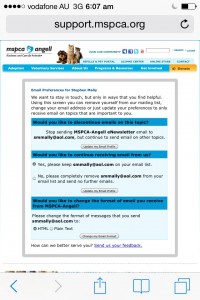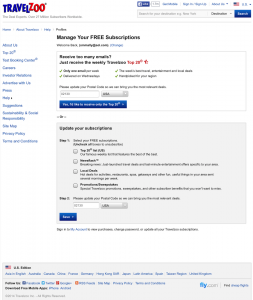Six degrees of separation – making it difficult for your supporters to opt out
 Like you, I receive heaps of Email daily. I get a lot of Email. I find myself repeatedly deleting Emails each week from the same companies and non-profit organisations without reading the Emails. I needed to get the volume of unwanted, or unread, Email under control.
Like you, I receive heaps of Email daily. I get a lot of Email. I find myself repeatedly deleting Emails each week from the same companies and non-profit organisations without reading the Emails. I needed to get the volume of unwanted, or unread, Email under control.
I thought, if I am deleting these emails each day, why don’t I simply opt out of the lists so I do not have to deal with the volume in my inbox?
I spent quite a bit of time trying to opt out of the Emails and found for some organisations, it is actually quite difficult, and time-consuming, to get to the end point. Many ask me reasons I want to opt out and others try to convince me to better state my communication preferences while trying to maintain me in the end.
I cannot blame these companies because they should be trying to keep me!
 Take MSPCA Angell Memorial Hospital for example. Angell Memorial is a place where I used to take my pets in Boston and my animals were well taken care by this wonderful organisation. However, I do not live in Boston any longer. If I did, I likely would maintain contact with Angell. I went to opt out of receiving multiple emails from Angell and they first tried to get me to change my mind by offering me a multitude of options. Thereafter I was allowed to finally opt out and I was sent to a final screen where they suggested a way to get back on their list should my needs change in the future.
Take MSPCA Angell Memorial Hospital for example. Angell Memorial is a place where I used to take my pets in Boston and my animals were well taken care by this wonderful organisation. However, I do not live in Boston any longer. If I did, I likely would maintain contact with Angell. I went to opt out of receiving multiple emails from Angell and they first tried to get me to change my mind by offering me a multitude of options. Thereafter I was allowed to finally opt out and I was sent to a final screen where they suggested a way to get back on their list should my needs change in the future.
Take Travelzoo, a travel website in the US. I probably used Travelzoo once or twice in my life. Yet, this site too, sends me a multitude of emails throughout a given month.. I went to opt out of Travelzoo and faced a similar exercise as Angell Memorial.

I have often times told non-profit organisations they should work hard to turn a negative into a positive and this is exactly what these two organisations, and countless others, have done as I have been opting out of (or trying to!) their electronic communications over the last week.
When I work with organisations, I suggest they work hard when someone rings their office to opt out of direct mail to turn those calls around by offering the caller a chance to receive just one appeal a year. I further suggest these organisations offer supporters who wish to opt out the chance to select which appeal to receive, as well as the channel. It is exactly what these organisations above did with me online?
What do you feel is best practice in regard to opt out procedures? What process does your organisation put supporters through? Are your online processes similar to offline processes?
